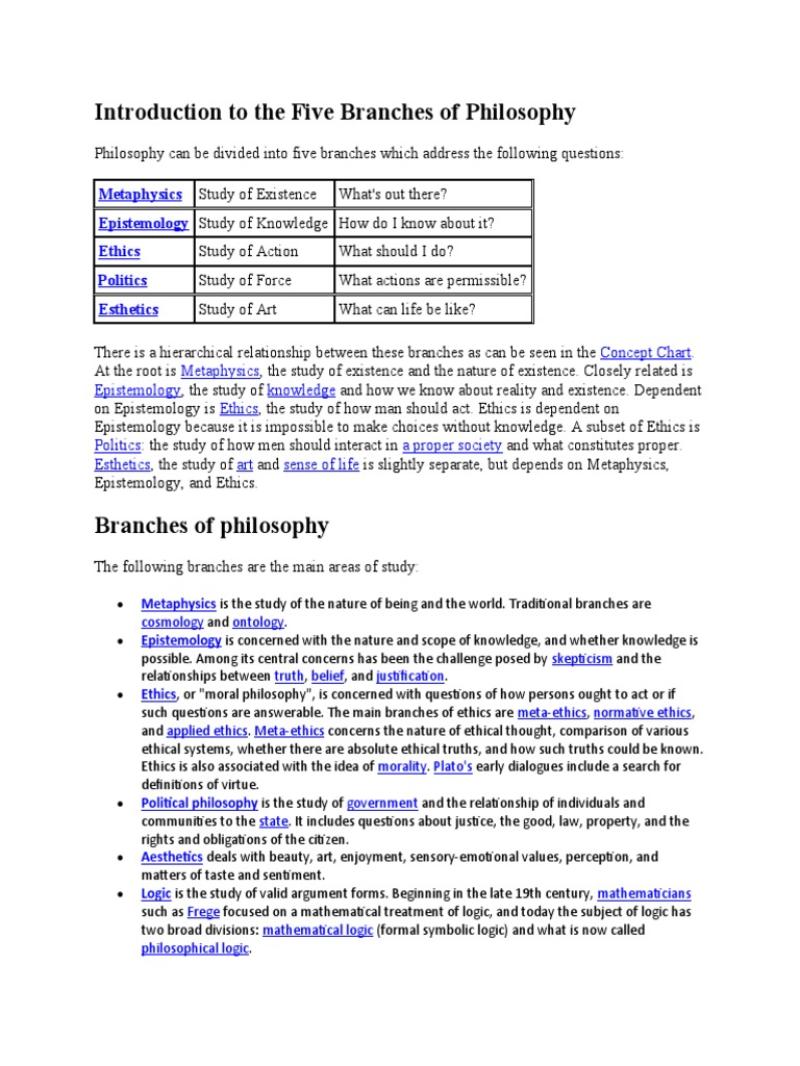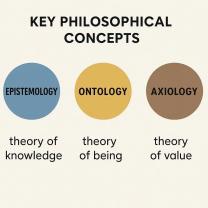Which branch of philosophy is most important?
The importance of philosophical branches can vary based on personal perspectives, societal needs, and the context in which they're applied. Each branch contributes uniquely to our understanding of the world and human existence. Here's a brief overview of some key branches and their significance:
Metaphysics: This branch explores fundamental questions about reality, existence, the nature of being, and the relationship between mind and matter. It delves into questions about the nature of time, space, causality, and the ultimate nature of reality.
Epistemology: Concerned with the nature of knowledge, justification, and belief. It examines how we acquire knowledge, the limits of what we can know, and the criteria for what constitutes valid knowledge.
Ethics: Focuses on questions of morality, right and wrong, and what constitutes a good life. It explores ethical theories, principles, and the application of moral values to individual actions and societal structures.
Logic: Concerned with reasoning, argumentation, and valid inference. It studies the principles of valid reasoning, deduction, induction, and the structure of arguments.
Aesthetics: Explores the nature of beauty, art, and taste. It examines questions about the nature of artistic expression, the definition of beauty, and the role of art in society and human experience.
As for which branch is most important, it's challenging to single out one as the most crucial, as they all contribute uniquely to our understanding of the world. The significance of each branch can vary depending on different contexts:
- Practical Significance: Ethics, for example, is often considered highly significant as it deals with moral decision-making, guiding individual actions and societal policies.
- Theoretical Significance: Metaphysics and epistemology provide the foundational groundwork for understanding reality and knowledge, contributing to how we perceive and interpret the world.
Each branch interacts with others, and they often intersect in complex ways. For instance, ethical decisions may involve elements of metaphysics (considering the nature of good and evil) and epistemology (how we come to know what is morally right or wrong).
Ultimately, the importance of a philosophical branch can depend on one's interests, societal needs, and the specific questions or issues being explored at any given time. Philosophical inquiry benefits from a holistic approach that considers the interplay among these branches.
Consensus on the Most Influential Branch of Philosophy
There is no single, universally agreed-upon answer to the question of which branch of philosophy is the most influential. Different philosophers and scholars have different perspectives, and the relative importance of each branch can vary depending on the context and historical period.
However, some branches of philosophy are often considered to be particularly influential:
- Metaphysics: This branch attempts to understand the fundamental nature of reality, including questions about existence, consciousness, and the laws of nature. Metaphysical concepts have profoundly influenced various fields, including science, religion, and art.
- Epistemology: This branch deals with the nature of knowledge and justification. It investigates how we can acquire knowledge, what constitutes justified belief, and the limits of human understanding. Epistemology plays a crucial role in various disciplines, such as science, law, and education.
- Ethics: This branch focuses on questions of right and wrong, morality, and the good life. Ethical theories have shaped social and political systems, legal frameworks, and individual decisions throughout history.
- Logic: This branch studies the principles of valid reasoning and argumentation. It provides the tools for critical thinking and evaluating arguments, and its principles are used across various disciplines.
Importance of Ethics compared to Other Branches
Ethics occupies a unique and vital space within philosophy. Here's how its importance compares to other branches:
1. Practical Relevance: Ethics directly addresses questions of right and wrong, impacting our individual behavior and societal norms. It provides a framework for making moral decisions and navigating ethical dilemmas.
2. Universal Applicability: Ethical principles have universal applicability, transcending cultural, religious, and historical boundaries. They provide a common ground for discussion and deliberation across diverse perspectives.
3. Societal Impact: Ethical considerations inform social and political systems, legal codes, and policies. They guide our actions towards promoting fairness, justice, and the well-being of individuals and communities.
4. Interconnectedness: Ethics is interconnected with other branches of philosophy. Metaphysical theories influence our understanding of the moral landscape, epistemological concerns shape our justification for moral beliefs, and logic helps us evaluate ethical arguments.
5. Continuous Evolution: Ethical questions evolve over time as societies change and new technologies emerge. This ongoing dialogue ensures that ethics remains relevant and responsive to contemporary challenges.
While other branches of philosophy explore fundamental concepts and provide valuable tools for understanding the world, ethics holds a unique position in addressing practical issues, shaping societal structures, and guiding our individual actions towards a more just and equitable world.
It's important to remember that all branches of philosophy are interconnected and contribute to our overall understanding of ourselves and the world around us. The relative importance of each branch can vary depending on individual interests and specific contexts.













